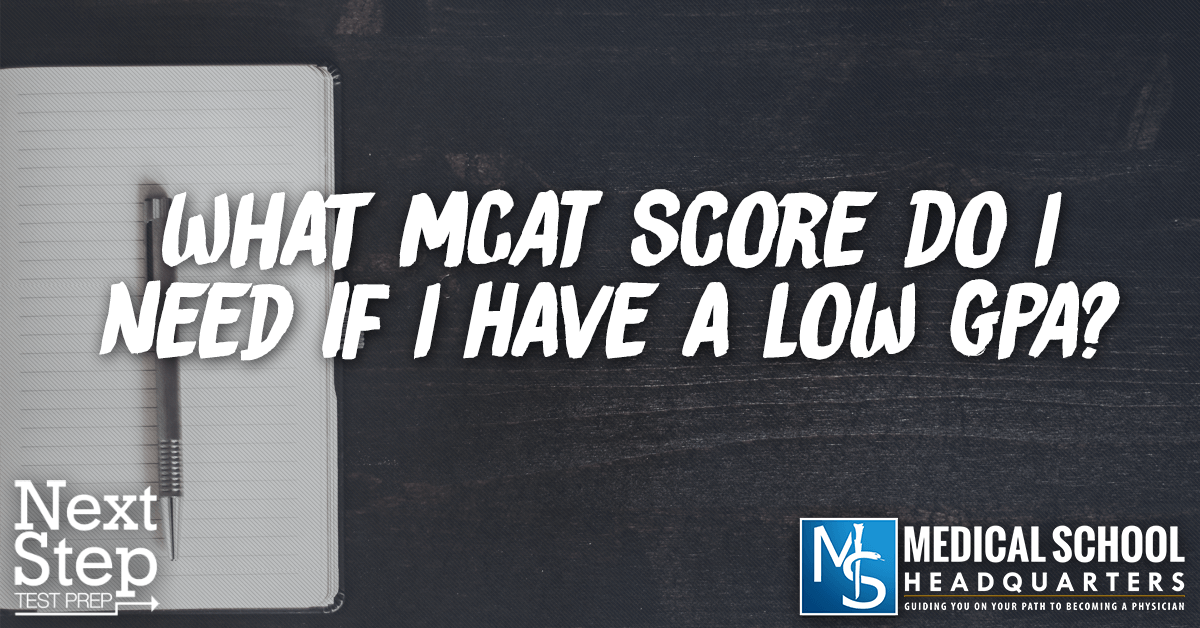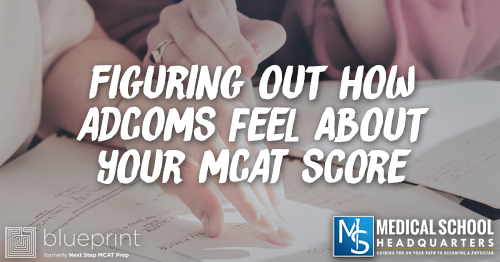Apple Podcasts | Google Podcasts

Session 80
If your GPA is low, you may have heard that the MCAT might save you if you get a good enough score. Bryan Schnedeker, VP for Content Development at Blueprint MCAT (formerly Next Step Test Prep), is again joining us as tackle a common question that comes in about GPA and MCAT score.
[01:17] What MCAT score do you need to overcome a low GPA?
Medical schools do holistic admissions. They look at everything, not just the numbers. So Bryan says that the correct answer to this questions is that there isn’t a single number.
Medical schools do holistic admissions. They look at everything, not just the numbers.Click To TweetBased on AAMC Data Table A-23, you will see an MCAT and GPA grid for applicants and accepted students. There’s a ton of really good and interesting data there.
Don’t obsess over the data in the table: It’s not the end-all-be-all, due to holistic admissions. But the data can help you wrap your head around the question.
Low GPA, High MCAT
Looking at the table, the acceptance rate for all GPAs and all MCAT scores is listed as 41.9%. This is the baseline. This means that the average premed has about a 42% chance of getting into medical school overall.
So comparing any specific GPA and MCAT combination against that baseline average of 42%, you can see what is above average and what is below. So you can see what’s an asset and what’s a detriment to your application.
So if you have a 3.0 GPA, this puts you well behind in the running: The GPA slice from 3.0 to 3.19 only has an overall acceptance rate of 15.2%. This really hurts compared to a national average of over 40%, you’ve only got a 15% chance of getting in.
But what if you only have a GPA of 3.0-3.10 and you want to increase your chances by getting a high MCAT score? Well, if you can get your MCAT to the 514-517 score range, then the odds of getting accepted goes up to 41.7%, even with a 3.0 to 3.10 GPA. (Interestingly, if you’re over 517 with that same GPA, it’s only 36%.)
[04:23] Interpreting Historical MCAT Data
Please understand that this is just historical data, which means that the chart was based on the data for last year. Next year, you may need a 518. So we don’t know. Hence, it’s really hard to look at this data and conclude anything solid about the score you need.
Moreover, don’t focus on just the score. Obviously, scoring as good as you can is the answer—and then make sure that everything else is there in your application as well: a personal statement that really tells your story, strong extracurriculars and clinical experience, strong letters of recommendation. As mentioned above, your application is not just your MCAT and GPA!
GPA and MCAT cutoffs
This being said, in order for your application to survive to that holistic admissions part, you need to make sure that you get past the digital shredders, the filters. Schools have filters set up where if you have below a certain GPA or below a certain MCAT score, the school may not even look at your application.
If you do find yourself below those cutoffs, you need to advocate for yourself to get your application manually reviewed.
[06:33] What If Your GPA Is Below 3.0?
Bryan refers to the next level down in GPA, from 2.80 to 2.99, where the national average for acceptance rate is under 10%. So when you’re asking what you have to do to make up for a low GPA, it really depends specifically, what was your total GPA?
If for instance, you had a really bad freshman year that dragged your GPA down to 2.85, then you need to go back to school. Take a master’s program. Get straight A’s. Because no matter what your MCAT score, once you drop below 3.0 GPA, the acceptance rate just drops off a cliff.
No matter what your MCAT score, once you drop below 3.0 GPA, the acceptance rate just drops off a cliff.Click To TweetAn Upward Trend in GPA is Powerful
But it’s not all about total GPA. Medical schools look at whether you have an upward trend or a downward trend in your grades over time. Even if your overall undergrad GPA looks terrible, if you have a strong positive trend and you have a good MCAT score and the rest of your application looks great, then that’s great.
Medical schools look at whether you have an upward trend or a downward trend in your grades over time.Click To Tweet[07:57] Maximize Your MCAT Score with Next Step
Time and time again, the feedback we get from students is that Blueprint MCAT (formerly Next Step Test Prep) tutoring, course, and practice tests are all the best. They feel they’re learning better, they’re treated better, and the materials are better. Check out Next Step here.
Links and Other Resources
- AAMC Data Table: Acceptance Rates Based on GPA and MCAT
- Check out my book about the MCAT, co-written with Blueprint MCAT (formerly Next Step Test Prep): The Premed Playbook: Guide to the MCAT.
- Related episode: He Figured Out How to Overcome His 2.75 Undergrad GPA
- Related episode: If I Can’t Get a 3.0 GPA, What Do I Do Next?
- Need MCAT Prep? Save on tutoring, classes, and full-length practice tests by using promo code “MSHQ” for 10% off Next Step full-length practice tests or “MSHQTOC” for $50 off MCAT tutoring or the Next Step MCAT Course at Blueprint MCAT (formerly Next Step Test Prep)!
SEARCH SITE
SEARCH SITE
LISTEN FOR FREE











